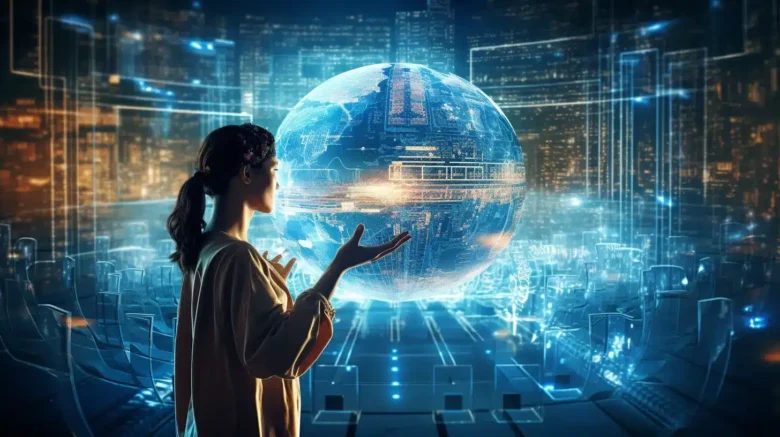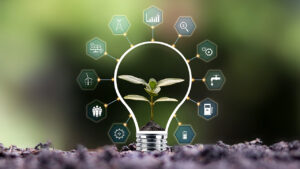Once the stuff of science fiction writers, it’s now a staple of our everyday lives. Emerging technologies have evolved from theoretical ideas to real-world inventions, ushering in a new era of possibilities. From blockchain technology transforming finance to artificial intelligence mimicking human behavior, science fiction ideas are no longer far-fetched dreams. In this blog, we explore the wonderful technologies of today that are changing the way we live, work, and interact with the world around us.
Machine Learning and Artificial Intelligence
Artificial intelligence (AI) and machine learning (ML) are rapidly evolving from theoretical speculation to practical applications, transforming every discipline. AI technologies like virtual assistants (Siri and Alexa) and language models (like ChatGPT) analyze natural language every day, solve problems, and generate material with near-human accuracy. They serve our personal and business needs. A subset of AI called machine learning analyzes large amounts of data to spot trends, predict outcomes, and automate difficult activities like fraud detection and customized marketing. Good examples of science fiction ideas being implemented today include developments like self-driving cars and facial recognition software.
In addition to their technological wonders, AI and machine learning have also sparked ethical debates, particularly over bias, safety, and their ability to replace human jobs. The challenges are real, but so are the possibilities for humanizing and personalizing technology in ways we once thought impossible.
Virtual Reality and Augmented Reality
Think of the intriguing fantasy worlds created in movies and literature, like The Matrix and Tron. Thanks to augmented reality (AR) and virtual reality (VR), access to these worlds is becoming more than just a story. VR creates fully immersive digital spaces that make virtual collaboration, training, and gaming more fun than anyone ever imagined. Popular VR headsets like the Oculus Rift and PlayStation VR have made the technology more accessible than ever, allowing users to easily “travel” to uncharted galaxies or travel through time into the past.
Augmented reality connects the digital and physical worlds by adding interactive components to our immediate surroundings. Perfect examples of how AR can easily be integrated into our daily lives include Snap Filters, Pokémon GO, and shopping apps that let you “try on” clothes or organize furniture. Industries such as real estate and healthcare are already using these technologies to transform the user experience, turning science fiction possibilities into useful tools.
Automation and Robotics
In a sense, the movies have made images of robots leading armies, interacting emotionally with humans, or working alongside people on assembly lines in factories a reality. The main shapers of the infrastructure of the modern world are robotics and automation. High-precision industrial robots streamline the manufacturing process by increasing output and efficiency, thereby reducing the amount of human labor required for heavy physical work. Robotics is also changing the way healthcare is delivered, as surgical robots can perform complex operations with greater precision than human surgeons.
In the home, autonomous cleaning robots like the Roomba are a sign of the boredom of robotic technology designed for convenience. Companies like Boston Dynamics have gone even further, developing robots that can lift objects, open doors, and navigate obstacle courses. Robotics has enormous promise, but it also raises ethical questions about the potential abuse of autonomous systems, human dependency, and job losses. We are only just beginning to understand the benefits they can bring.
Blockchain Technology
Many people associate blockchain with digital currencies like Bitcoin and Ethereum. However, this previously specialized technology has found applications far beyond digital currencies. Blockchain is revolutionizing various industries such as finance, supply chain management, healthcare, and even voting systems. In essence, it enables a secure, tamper-proof, decentralized ledger. Professionals and businesses are increasingly interested in how blockchain can secure complex transactions and provide fair access to immutable data.
Decentralized finance (DeFi), for example, allows anyone to borrow or lend money directly, without the need for banks. The use of blockchain to confirm the provenance of valuable goods, such as diamonds or designer handbags, also highlights its potential to transform global trade. Although blockchain is still a young player, its science fiction-like openness could restore public trust in a sector riddled with scandals and data breaches.
Genetic Engineering and Biotechnology
Biotechnology has advanced to levels once thought impossible. Genetic engineering, a technological marvel straight out of science fiction, is causing a stir in healthcare, agriculture, and other sectors. By precisely manipulating DNA sequences, methods such as CRISPR (clustered regularly interspaced short palindromic repeats) are changing the way we treat diseases. Initiatives are being taken to eradicate genetic diseases and improve crops for higher yields, and even methods such as cloning are being used to resurrect extinct species.
A perfect example of how biotechnology can provide for emergencies is the COVID-19 vaccines, particularly the mRNA vaccines developed by Moderna and Pfizer-BioNTech. These medical advances are possible thanks to years of research and a tremendous dedication to bringing biotechnology from theory to reality. While ethical issues remain of great importance, both in genetic engineering and in the application of biotechnology, these technologies show that humanity is exploring uncharted scientific frontiers.
Conclusion
Emerging technologies are no longer distant fantasies from science fiction movies or speculative literature but actual realities. Their presence is improving our world in ways that exceed expectations. Technologies such as AI, AR/VR, robotics, blockchain, and biotechnology are transforming the present into what futurists once envisioned: from solving everyday problems to unlocking extraordinary human potential.
One thing is certain: we are witnessing a reality shaped by what was once unbelievable. Despite the challenges that lie ahead, including constant adaptation, moral scrutiny, and the potential for unintended consequences, we must remain optimistic and embrace emerging technologies. If predictions about the future inspire you, stay interested and embrace emerging technologies. This world is more like science fiction than ever .
FAQs
1. What is emerging technology?
A variety of industries and sectors are currently developing or increasingly using emerging technologies. Some of the many possibilities include genetic engineering, blockchain, and artificial intelligence.
2. Why is emerging technology so important?
Emerging technologies drive growth by enabling people and businesses to transcend boundaries, increase efficiency, and deliver goods and services that were once unthinkable.
3. What are the challenges of adopting emerging technologies?
These challenges include high implementation costs, ethical issues, job losses, data security concerns, and the need to train and educate people to use emerging technologies properly.
4. What can I do to stay up-to-date on technology trends?
Read tech news, attend industry conferences, subscribe to innovation blogs, or participate in online forums dedicated to forward-thinking conversations.
5. Are Future Science Fiction Inventions Feasible?
Many ideas in science fiction are outdated. As research and development progress, we can expect more and more ideas from the future to become reality.




